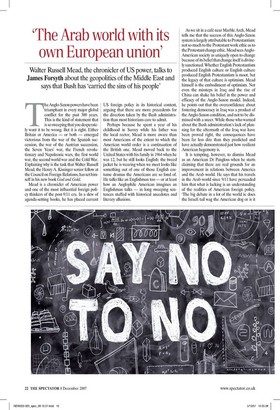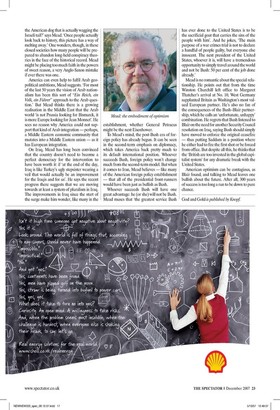'The Arab world with its own European union'
Walter Russell Mead, the chronicler of US power, talks to James Forsyth about the geopolitics of the Middle East and says that Bush has 'carried the sins of his people' The Anglo-Saxon powers have been triumphant in every major global conflict for the past 300 years. This is the kind of statement that is so sweeping that you desperately want it to be wrong. But it is right. Either Britain or America — or both — emerged victorious from the war of the Spanish succession, the war of the Austrian succession, the Seven Years' war, the French revolutionary and Napoleonic wars, the first world war, the second world war and the Cold War. Explaining why is the task that Walter Russell Mead, the Henry A. Kissinger senior fellow at the Council on Foreign Relations, has set himself in his new book God and Gold.
Mead is a chronicler of American power and one of the most influential foreign policy thinkers of the post-9/11 era. In a slew of agenda-setting books, he has placed current US foreign policy in its historical context, arguing that there are more precedents for the direction taken by the Bush administration than most historians care to admit.
Perhaps because he spent a year of his childhood in Surrey while his father was the local rector, Mead is more aware than most Americans of the extent to which the American world order is a continuation of the British one. Mead moved back to the United States with his family in 1964 when he was 12, but he still looks English: the tweed jacket he is wearing when we meet looks like something out of one of those English costume dramas the Americans are so fond of. He talks like an Englishman too — or at least how an Anglophile American imagines an Englishman talks — in long sweeping sentences stuffed with historical anecdotes and literary allusions.
As we sit in a café near Marble Arch, Mead tells me that the success of this Anglo-Saxon system is largely attributable to Protestantism: not so much to the Protestant work ethic as to the Protestant change ethic. Mead sees AngloAmerican society as uniquely open to change because of its belief that change itself is divinely sanctioned. Whether English Protestantism produced English culture or English culture produced English Protestantism is moot, but the legacy of that culture is optimism. Mead himself is the embodiment of optimism. Not even the missteps in Iraq and the rise of China can shake his belief in the power and efficacy of the Anglo-Saxon model. Indeed, he points out that the overconfidence about fostering democracy in Iraq was a product of the Anglo-Saxon condition, and not to be dismissed with a sneer. While those who warned about the Bush administration's lack of planning for the aftermath of the Iraq war have been proved right, the consequences have been far less dire than they predicted and have actually demonstrated just how resilient American hegemony is.
It is tempting, however, to dismiss Mead as an American Dr Pangloss when he starts claiming that there are real grounds for an improvement in relations between America and the Arab world. He says that his travels in the Arab world since 9/11 have persuaded him that what is lacking is an understanding of the realities of American foreign policy. 'The big debate in a lot of the world is: does the Israeli tail wag the American dog or is it the American dog that is actually wagging the Israeli tail?' says Mead. 'Once people actually look back to history, this picture has a way of melting away.' One wonders, though, in these closed societies how many people will be prepared to abandon long-held conspiracy theories in the face of the historical record. Mead might be placing too much faith in the powers of sweet reason, a very Anglo-Saxon mistake if ever there was one.
America can even help to fulfil Arab geopolitical ambitions, Mead suggests. Tor most of the last 50 years the vision of Arab nationalism has been this sort of "EM Reich, em Volk em Fiihrer" approach to the Arab question.' But Mead thinks there is a growing realisation in the Middle East that the Arab world 'is not Prussia looking for Bismarck, it is more Europe looking for Jean Monnet'. He sees no reason why America could not support that kind of Arab integration — perhaps, a Middle Eastern economic community that mutates into a Middle Eastern union — as it has European integration.
On Iraq, Mead has long been convinced that the country doesn't need to become a perfect democracy for the intervention to have been worth it: if 'at the end of the day, Iraq is like Turkey's ugly stepsister wearing a veil that would actually be an improvement for the Iraqis and for us'. He says the recent progress there suggests that we are moving towards at least a system of pluralism in Iraq. The improvements in Iraq since the start of the surge make him wonder, like many in the s"(x) establishment, whether General Petraeus might be the next Eisenhower.
To Mead's mind, the post-Bush era of foreign policy has already begun. It can be seen in the second-term emphasis on diplomacy, which takes America back pretty much to its default international position. Whoever succeeds Bush, foreign policy won't change much from the second-term model. But when it comes to Iran, Mead believes — like many of the American foreign policy establishment — that all of the presidential front-runners would have been just as bullish as Bush.
Whoever succeeds Bush will have one great advantage: he (or she) will not be Bush. Mead muses that `the greatest service Bush has ever done to the United States is to be the sacrificial goat that carries the sins of the people with him'. And he jokes, 'The main purpose of a war crimes trial is not to declare a handful of people guilty, but everyone else innocent. The next president of the United States, whoever it is, will have a tremendous opportunity to simply travel around the world and not be Bush: 50 per cent of the job done already.'
Mead is no romantic about the special relationship. He points out that from the time Winston Churchill left office to Margaret Thatcher's arrival at No. 10, West Germany supplanted Britain as Washington's most valued European partner. He's also no fan of the consequences of the Bush–Blair partnership, which he calls an 'unfortunate, unhappy' combination. He regrets that Bush listened to Blair on the need for another Security Council resolution on Iraq, saying Bush should simply have moved to enforce the original ceasefire — thus putting Saddam in a position where he either had to fire the first shot or be forced from office. But despite all this, he thinks that the 'British are too invested in the global capitalist system' for any dramatic break with the United States.
American optimism can be contagious, as Blair found, and talking to Mead leaves one bullish about the future. After all, 300 years of success is too long a run to be down to pure chance.
God and Gold is published by Knopf


























































 Previous page
Previous page